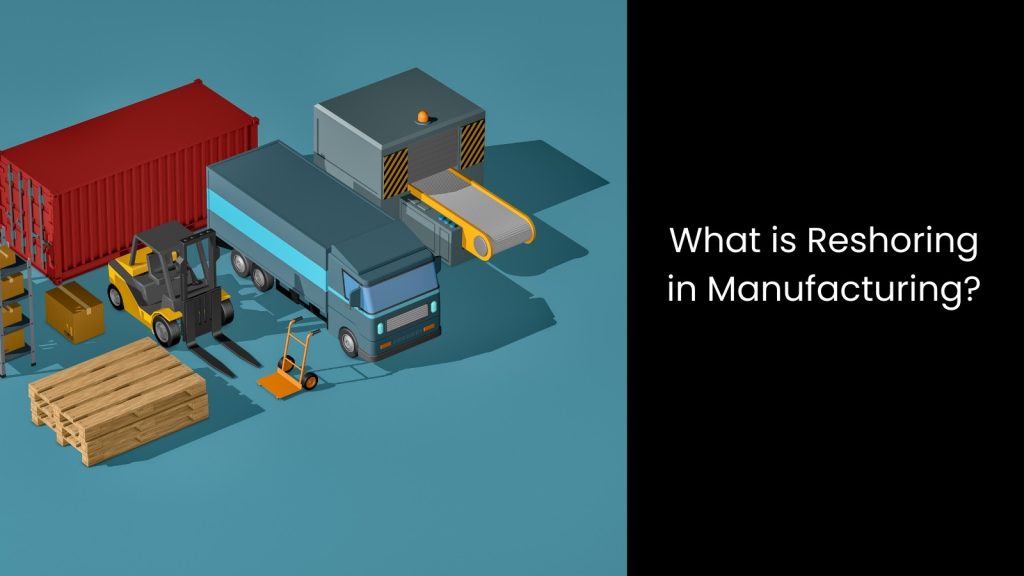Did you know that reshoring has become a global trend, especially among small manufacturers looking to regain control over their production? As companies move their operations back to their home countries, they are benefiting from reduced transportation costs, less risk of supply chain disruptions, and quicker time-to-market. Reshoring opportunities have become increasingly popular as small manufacturers aim to overcome challenges posed by overseas production, such as long shipping times, unpredictable tariffs, and potential intellectual property theft. Domestic manufacturing offers businesses a chance to protect their innovations, cut down on expensive imports, and build stronger connections with local suppliers. However, is it really a good strategy to be followed by small-scale manufacturers?
This article covers how small manufacturers can benefit from reshoring opportunities beyond limitations.
This article covers how small manufacturers can benefit from reshoring opportunities beyond limitations.
What is Reshoring in Manufacturing?

First, we will understand this concept.
- If we look into its definition, reshoring in manufacturing means bringing production back to the home country after previously moving it overseas. Manufacturers take this step to regain control over their operations, reduce dependency on foreign suppliers, and improve production efficiency.
- The process starts with companies assessing the challenges of offshore production, such as long shipping times, unpredictable trade policies, and quality control issues. Once they decide to shift manufacturing back, they set up local facilities, secure raw materials, and hire workers to restart operations domestically.
- Moreover, reshoring opportunities open doors for businesses to collaborate with local suppliers, integrate automation, and refine production workflows to match demand. Manufacturers also rethink their cost structures by balancing labour expenses with savings on shipping, tariffs, and supply chain disruptions.
- As more businesses shift towards reshoring, the manufacturing landscape evolves with smarter production processes and better adaptability to market changes. This is why the manufacturing industry calls it a ‘trend-setter’!
Benefits of Reshoring Opportunities for Small Manufacturers

Lowering Transportation Costs
Transportation is one element that quickly pokes into a small manufacturer’s budget, especially when dealing with long-distance shipping from overseas suppliers. Reshoring helps cut these costs by keeping production closer to home, eliminating the need for expensive international freight and reducing the risks of unexpected delays.
Manufacturers no longer have to deal with the rising costs of container shipping, fluctuating fuel prices, or the impact of trade restrictions. Instead, they can shift to more efficient local delivery systems, which speed up product movement and lower transportation expenses. Shorter supply chains also remove unnecessary steps in logistics and reduce warehousing needs and cut down on extra handling fees.
Small manufacturers benefit from predictable shipping timelines, as it allows them to plan inventory more effectively without overstocking or running out of materials. Without the burden of customs fees and import taxes, they free up funds to reinvest in better equipment, workforce expansion, or improved product development.
Domestic suppliers also respond faster to order changes, helping businesses adapt to shifting market demands without waiting weeks for overseas shipments.
As reshoring opportunities continue to reshape manufacturing, small businesses gain an advantage by running leaner operations and staying ahead of unpredictable global supply chain issues.
Manufacturers no longer have to deal with the rising costs of container shipping, fluctuating fuel prices, or the impact of trade restrictions. Instead, they can shift to more efficient local delivery systems, which speed up product movement and lower transportation expenses. Shorter supply chains also remove unnecessary steps in logistics and reduce warehousing needs and cut down on extra handling fees.
Small manufacturers benefit from predictable shipping timelines, as it allows them to plan inventory more effectively without overstocking or running out of materials. Without the burden of customs fees and import taxes, they free up funds to reinvest in better equipment, workforce expansion, or improved product development.
Domestic suppliers also respond faster to order changes, helping businesses adapt to shifting market demands without waiting weeks for overseas shipments.
As reshoring opportunities continue to reshape manufacturing, small businesses gain an advantage by running leaner operations and staying ahead of unpredictable global supply chain issues.
Reducing Intellectual Property Risks
This is where reshoring opportunities become a weapon for small manufacturers looking to protect their intellectual property from theft and counterfeiting.
Sending designs and production plans to overseas factories often comes with risks, as some regions have weaker enforcement of copyright laws, making it easier for unauthorised copies to flood the market. Domestic production removes this concern, keeping trade secrets, patents, and proprietary technology within a controlled environment.
Manufacturers no longer have to worry about competitors gaining access to sensitive designs or factory workers replicating products for unauthorised resale.
Shorter supply chains also limit the number of third parties handling production. This reduces the chances of data leaks or security breaches. Further, local facilities allow businesses to monitor production closely, ensuring that only authorised personnel access confidential information. With stronger legal protections and stricter enforcement of intellectual property rights, companies can take legal action more effectively against any potential violations.
This shift not only secures valuable innovations but also builds consumer trust, as customers receive authentic, high-quality products without the risk of counterfeits.
Small manufacturers can gain peace of mind, knowing their hard work will not be copied and sold at lower prices in global markets.
This way, reshoring continues to offer a safer approach to production.
Sending designs and production plans to overseas factories often comes with risks, as some regions have weaker enforcement of copyright laws, making it easier for unauthorised copies to flood the market. Domestic production removes this concern, keeping trade secrets, patents, and proprietary technology within a controlled environment.
Manufacturers no longer have to worry about competitors gaining access to sensitive designs or factory workers replicating products for unauthorised resale.
Shorter supply chains also limit the number of third parties handling production. This reduces the chances of data leaks or security breaches. Further, local facilities allow businesses to monitor production closely, ensuring that only authorised personnel access confidential information. With stronger legal protections and stricter enforcement of intellectual property rights, companies can take legal action more effectively against any potential violations.
This shift not only secures valuable innovations but also builds consumer trust, as customers receive authentic, high-quality products without the risk of counterfeits.
Small manufacturers can gain peace of mind, knowing their hard work will not be copied and sold at lower prices in global markets.
This way, reshoring continues to offer a safer approach to production.
Faster Time-to-Market
Another way reshoring opportunities help small manufacturers is by speeding up production and getting products to market faster.
Long overseas supply chains create delays at every stage, from raw material sourcing to final product delivery. Shipping goods across borders takes weeks, and unexpected hold-ups like port congestion, customs clearance, or factory shutdowns only make things worse. Did you notice this?
However, producing goods domestically removes these roadblocks and allows manufacturers to cut lead times and respond to customer orders with better accuracy. Local factories operate on shorter timelines, making it easier to adjust production schedules, scale output, and introduce new designs without waiting months for overseas shipments.
Businesses also avoid the challenge of coordinating with multiple international suppliers, reducing miscommunication and errors that slow down the process. Faster production means manufacturers can keep up with market trends, fulfil urgent orders, and restock inventory before competitors rely on offshore production.
On the other hand, customers expect quicker turnaround times, and reshoring opportunities give small manufacturers the ability to meet those demands without unnecessary delays. Streamlining production locally also reduces excess stock sitting in warehouses, keeping costs under control while ensuring fresh, high-quality products reach buyers on time.
Long overseas supply chains create delays at every stage, from raw material sourcing to final product delivery. Shipping goods across borders takes weeks, and unexpected hold-ups like port congestion, customs clearance, or factory shutdowns only make things worse. Did you notice this?
However, producing goods domestically removes these roadblocks and allows manufacturers to cut lead times and respond to customer orders with better accuracy. Local factories operate on shorter timelines, making it easier to adjust production schedules, scale output, and introduce new designs without waiting months for overseas shipments.
Businesses also avoid the challenge of coordinating with multiple international suppliers, reducing miscommunication and errors that slow down the process. Faster production means manufacturers can keep up with market trends, fulfil urgent orders, and restock inventory before competitors rely on offshore production.
On the other hand, customers expect quicker turnaround times, and reshoring opportunities give small manufacturers the ability to meet those demands without unnecessary delays. Streamlining production locally also reduces excess stock sitting in warehouses, keeping costs under control while ensuring fresh, high-quality products reach buyers on time.
Less Supply Chain Disruptions
Last but not least, reshoring gives small manufacturers a way to avoid the headaches caused by global supply chain disruptions.
Relying on overseas suppliers means constantly dealing with shipping delays, raw material shortages, and unpredictable geopolitical tensions that throw production schedules off track. Trade restrictions, sudden factory shutdowns, and transportation bottlenecks create uncertainty, forcing businesses to scramble for alternatives.
Bringing production closer to home removes these risks. It gives manufacturers more control over their operations. Shorter supply chains indicate fewer weak links, making it easier to keep production running smoothly without waiting months for shipments stuck at ports. Domestic suppliers also react faster to market changes, preventing sudden stockouts or production halts caused by international disruptions.
This way, small businesses no longer have to worry about currency fluctuations affecting material costs or unexpected policy changes increasing import taxes. A stable and predictable supply chain allows manufacturers to focus on quality, efficiency, and customer satisfaction instead of constantly adapting to overseas uncertainties. Faster access to raw materials and streamlined logistics means businesses can plan better, reduce wasted time, and avoid unnecessary costs tied to supply chain instability.
As you can see, using this method, companies that produce goods locally gain a major advantage by staying resilient in the face of disruptions that continue to shake global markets.
Relying on overseas suppliers means constantly dealing with shipping delays, raw material shortages, and unpredictable geopolitical tensions that throw production schedules off track. Trade restrictions, sudden factory shutdowns, and transportation bottlenecks create uncertainty, forcing businesses to scramble for alternatives.
Bringing production closer to home removes these risks. It gives manufacturers more control over their operations. Shorter supply chains indicate fewer weak links, making it easier to keep production running smoothly without waiting months for shipments stuck at ports. Domestic suppliers also react faster to market changes, preventing sudden stockouts or production halts caused by international disruptions.
This way, small businesses no longer have to worry about currency fluctuations affecting material costs or unexpected policy changes increasing import taxes. A stable and predictable supply chain allows manufacturers to focus on quality, efficiency, and customer satisfaction instead of constantly adapting to overseas uncertainties. Faster access to raw materials and streamlined logistics means businesses can plan better, reduce wasted time, and avoid unnecessary costs tied to supply chain instability.
As you can see, using this method, companies that produce goods locally gain a major advantage by staying resilient in the face of disruptions that continue to shake global markets.
Cerexio Solution for Enhanced Supply Chain in Manufacturing

Cerexio presents a robust Warehouse Management System to support reshoring efforts of the manufacturing landscape by streamlining inventory management, reducing storage costs, and ensuring faster order fulfilment. Our Industry 4.0-backed-up solution helps manufacturers maintain a steady supply of raw materials, avoid production delays, and improve workflow efficiency.
Gaining the Best Benefits of Reshoring via Digital Solutions

It is time to experience the full benefits of reshoring through digital solutions. Optimising inventory management, improving product quality, and reducing supply chain risks – employing such advanced technology is not a mere dream anymore. Take a step forward and empower your business to meet customer demands faster while saving on transportation costs today.
